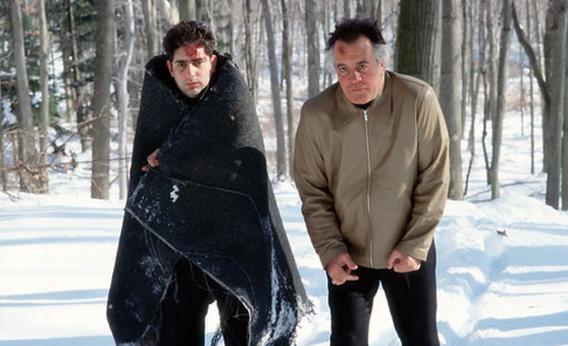 A scene from The Sopranos "Pine Barrens" episode
A scene from The Sopranos "Pine Barrens" episode Still courtesy HBO.
?Who gives a shit about this Russian?? David Chase says. The creator of The Sopranos has never understood his audience?s fascination with Valery, the Russian mobster who disappeared in the legendary ?Pine Barrens? episode. It was a one-off story that needed no closure, Chase says now. He recalls thinking, ?We did that show! I don?t know where he is! Now we?ve got to go and figure that out?!?!?
Terence Winter, who wrote ?Pine Barrens? and many of the series? other memorable outings, agreed with the fans on this one, much to Chase?s frustration, and kept pushing his boss to add a coda to that story in The Sopranos? final season. They finally hit on an idea everyone would be happy with: Tony and Christopher pay a visit to the local Russian mob boss, where they find Valery sweeping the floor, not recognizing Christopher thanks to a traumatic brain injury suffered when Chris and Paulie were shooting at him. (It would be explained that a local Boy Scout troop found him with part of his skull missing, and saved his life.) At the last minute, Chase changed his mind, and he recalls a despondent Winter insisting, ?God, you?re making a huge mistake leaving that on the table!?
But Chase?s disbelief that viewers would want resolution to that story?and his refusal to offer it?do give us clues as to what he really meant by the show?s finale, more than five years ago now. I revisited The Sopranos while writing my book, The Revolution Was Televised: The Cops, Crooks, Slingers and Slayers Who Changed TV Drama Forever, from which the following excerpt is taken. And in discussing the show?s incredible run, and its divisive finale, with Chase, I became more convinced that my initial take on what it all meant was correct.
Let?s face it: What drives people nuts in retrospect about this great show is the finale?specifically, the last six minutes of the finale.
Until we get to Tony, Carmela, and A.J. eating onion rings at Holsten?s ice cream parlor while Meadow struggles to parallel park and a guy in a Members Only jacket goes to the bathroom, it?s a finale very much in line with the way the previous seasons ended, with a mix of plot closure and reflection. Had the show ended on Tony walking away from Uncle Junior, or even on a more conventionally shot and edited family dinner, that episode, that final season, and the series as a whole would be remembered very differently. Instead, it almost feels bigger than the show it dropped a curtain on. It?s a scene that some love and others despise, while even within those groups there?s a deep division over what actually happened when Journey?s ?Don?t Stop Believing? cut off and the picture went to black.
Chase has never been willing to explain the meaning of that final scene?not in the interview he did with me the morning after the finale aired, not in the interview for this book, not in any of his other public comments since the show ended. He says he can?t imagine a circumstance under which he might change his mind. He admits he didn?t realize people would focus so heavily on that final scene at Holsten?s, forgetting everything that had happened earlier in the episode?or, in some cases, the entire series.
?I think that ending so enraged some people that it affected their whole view of the show,? he says. ?Why it would, I don?t know.?
Though he always wanted the work to speak for itself, Chase bristles when I suggest that he must enjoy the fact that people are still debating the ending years later, and likely will for as long as anyone cares about the show.
?If I say I enjoy that fact,? he says, ?how that gets interpreted is, ?He?s a sadist. He likes to fuck with people. He?s a mean guy.? I like to entertain people. I like to give them what?s entertaining, and if it has to be different and it has to rile them up, then it has to rile them up. So if I say I enjoy the fact that people are still analyzing the finale, it will come out as self-aggrandizing, sadistic, and [like] I was always playing head games.
?That show was very, very important to me,? he continues. ?Those characters were very important to me. I loved each and every one of those characters. I did not throw them away lightly or deal with them lightly. And it goes all the way from, ?Oh, it?s so he could do the movie,? to ?He got tired, he couldn?t figure it out? to ?He just wanted to fuck with us.? None of that was the case.?
Source: http://feeds.slate.com/click.phdo?i=de82998c82f9af46616be64e1db9039d
a.j. jenkins riley reiff david decastro aj jenkins shea mcclellin nfl draft 2012 whitney mercilus
No comments:
Post a Comment